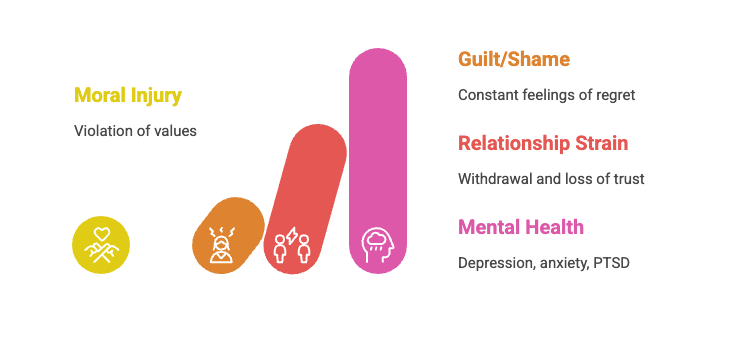Moral injury is real, but healing is possible through honesty, compassion, support, and renewed purpose.
About a year ago, our team travelled to southern Ethiopia, particularly to the Gofa zone, after a devastating mudslide that took the lives of hundreds in the community. We spent several days listening, offering psychological first aid, and supporting children, mothers, and church leaders. In those conversations, we began to notice something deeper than immediate grief. Many people carried heavy feelings of guilt, shame, and helplessness. Mothers spoke of not being able to save their children. Young people described feeling terrified and powerless as the disaster unfolded. Survivors and even helpers told stories filled with regret and unanswered “what if” questions. These are all signs of something known as moral injury.
A Wound Beyond Ordinary Trauma
Moral injury is a wound of the heart and mind that comes when a person’s deepest sense of right and wrong is violated. This can happen when someone feels they have done something wrong, failed to act in a way they believe they should have, or been betrayed by those they trusted. Unlike ordinary stress or trauma, moral injury touches a person’s values and conscience. It often leads to ongoing guilt, shame, anger, or a sense of betrayal. People may struggle to forgive themselves, to trust others, or to reconnect with their faith or community.
This experience is not limited to people who go through disasters. Moral injury can affect soldiers in conflict, healthcare workers who cannot save every patient, pastors who witness suffering they cannot prevent, or leaders who feel they failed their community. Even ordinary bystanders can carry moral injury simply because they survived while others did not. In every case, the wound is real and can weigh heavily on a person’s heart.
The Effects of Moral Injury and the Path to Healing
The effects of moral injury can show up in many ways. Some people feel constantly guilty or ashamed. Others struggle with sadness, anger, or even disgust toward themselves or others. Relationships may suffer as people withdraw or lose trust in those around them. Over time, moral injury can contribute to depression, anxiety, or post-traumatic stress. When left unaddressed, it can lead people to feel isolated and broken.
But moral injury does not mean the end of a story; it can also be the beginning of a journey toward healing. Healing starts with being able to name what has happened. When people learn that what they are experiencing is moral injury, they begin to understand they are not alone and that their pain is not a sign of weakness, but a human response to a painful reality. Safe spaces for honest conversations are essential. Survivors and helpers alike need opportunities to share their stories without fear of being judged or silenced.
Leaders, pastors, and caregivers play an important role in this healing process. They can help by listening with compassion, teaching about moral injury, and encouraging people to show kindness to themselves. Simple practices, such as telling someone, “What you went through would have been difficult for anyone,” can lift a heavy burden of shame. Leaders can also model honesty and humility by admitting their own struggles and mistakes, showing that imperfection is part of being human.

Finding Growth Through Pain
Professional help is another important resource. Counselling or therapy that focuses on moral injury can help people work through guilt, shame, and self-condemnation. Structured programs such as “Restore and Rebuild” have been developed to guide people in processing these experiences, reconnecting with their values, and finding a renewed sense of meaning. Where professional services are not available, community support, faith groups, and peer networks can also provide powerful spaces for healing.
It is also important to remember that growth can come through this pain. Many people who experience moral injury eventually discover new strength, resilience, and compassion. By facing their suffering honestly and walking through the healing process, they find renewed purpose and even become sources of encouragement for others. The very places of wounding can become places of growth.
If you are a leader, pastor, healthcare worker, or helper in Ethiopia, or anywhere else, know that moral injury is real and that your role in supporting others is vital. By creating environments of honesty, compassion, and integrity, you not only help others heal but also protect your own heart from carrying burdens alone. If you are someone who carries moral injury yourself, know that healing is possible, and you do not need to walk the road alone.
At the end of even the darkest tunnel, there can be light. With support, honesty, and compassion, people can move from pain to resilience, from guilt to grace, and from brokenness to renewed strength. This is the hope we carry when we talk about moral injury, not that we erase the past, but that we find ways to live fully and meaningfully beyond it.